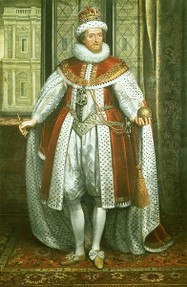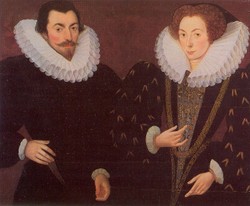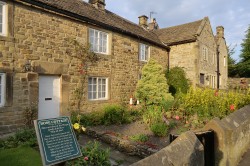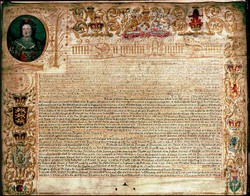
In Latin, the name James is rendered Jacobus. It's from this root that we get Jacobean, meaning the reign of King James VI of Scotland, or I of England and Wales.
On July 24th 1567, Mary, Queen of Scots, was forced to abdicate the throne in favor of her baby son. This is technically the very beginning of the Jacobean era, as it was the moment when King James became monarch of Scotland.
However, as he was only thirteen months old at the time, he didn't have much influence over events. Unless we're counting the need to feed, clean and dress him.
It wasn't until June 1583, when James was seventeen, that he began to assume power over his realm. That's really the true start of the Jacobean age in Scotland.
However, on March 24th 1603, Queen Elizabeth I died in England, leaving no Tudor heir. James of Scotland was proclaimed King of England too on the same day. This is the beginning of the English and Welsh Jacobean era.
We still haven't finished! Also on March 24th 1603, James had also been proclaimed King of Ireland, as Elizabeth claimed the crown there too. Unfortunately, the Irish were having none of that.
On March 11th 1605, James found it necessary to issue a proclamation, throughout Ireland, stating that all Irish people were his direct subjects and not answerable to a local lord or clan chief.
Saying it and the Irish obeying it are two very different things, but some could argue that this was the Jacobean age in Ireland now too. All done! Pick your country and take your date!
















 St Tydecho's Churches in West Waleson 09/03/2014
St Tydecho's Churches in West Waleson 09/03/2014
 Goodies for an Outlander Premiere Partyon 03/06/2015
Goodies for an Outlander Premiere Partyon 03/06/2015
 Holocaust Memorial Day Interview with Rainer Höss, Grandson of Rudolf Architect of Auschwitzon 01/24/2015
Holocaust Memorial Day Interview with Rainer Höss, Grandson of Rudolf Architect of Auschwitzon 01/24/2015
 Romantic Valentine Gifts for an Outlander Fanon 01/16/2015
Romantic Valentine Gifts for an Outlander Fanon 01/16/2015



Comments
Beginning of April. Christmas Day was March 25th, hence all of those shepherds and lambs in the Nativity. It caused some uproar at the time, when it was changed.
i'm intrigued when was new years day before it was Jan 1st?
As a Wiccan, I'm very glad that I wasn't around then.
Sounds like a good time to have missed....